|
Dusty Dog Reviews The whole project is hip, anti-academic, the poetry of reluctant grown-ups, picking noses in church. An enjoyable romp! Though also serious. |

|
Nick DiSpoldo, Small Press Review (on Children, Churches and Daddies, April 1997) Children, Churches and Daddies is eclectic, alive and is as contemporary as tomorrow’s news. |
Volume 215, December 2010
The Unreligious, Non-Family-Oriented Literary and Art Magazine
Internet ISSN 1555-1555, print ISSN 1068-5154
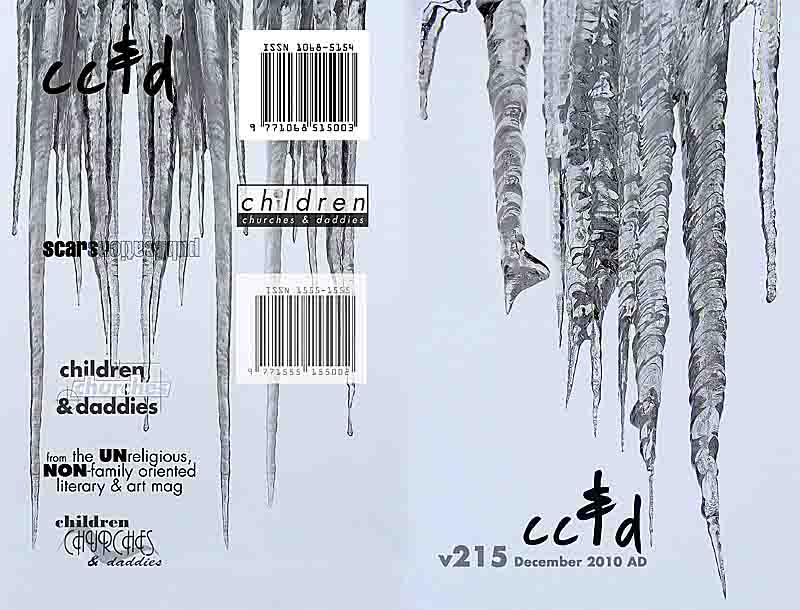
see what’s in this issue...
Note that in the print edition of cc&d magazine, all artwork within the pages of the book appear in black and white.
|
Order this issue from our printer as an ISSN# paperback book: or as the ISBN# book “Entering the Ice Age”: |

poetry
the passionate stuff
kalifornia christmasskaliforniamerry fuckin christmass drowning in our excess. presents candy and booze. some of us take an eternal snooze. we take a gun and blow our head off we have no family just a bottle of smirnoff. so when you open your presents remember the peasants who are dyin in the gutter. when you put butter on your bread someone is blowin of their head. happy birthday asshole thanx for all the hassle. thanx for creating a day when in order to receive love you have to pay for a present that you can’t afford. you’ll get nothing from me cause are’nt my lord but just this once i’ll make a wish that your dead and gone and sleep with the fish cause then we’ll be rid of this day and all over this country we’ll be able to say. no longer is it your birthday but just another day
|
Smokin Jesuskalifornialiquified organs go down the drain i must refrain from violence and keep my silence keep my hand in my pocket in my fist i squeeze her locket i took her eye out of it’s socket while she was still alive and had a snack then made her spine crack virgin mary give me a fuckin break that bitch would suck cock for a piece of cake out came jesus to fuck things up i’d slit his throat and fill my cup if he was alive but he’s dead you hear me? dead you can search your heart but you won’t find him but if i find his bones i’ll grind’em put’em in a bowl and take a hit now i have his soul inside me and i’m gonna sell it to the devil and get rich so take a hit cause now satans runnin shit have a drink and get hell to pay your not goin to hell your already here now take a hit of jesus it’s your turn if you don’t you’ll go to heaven and fuckin burn
|
Christ Before Plymouth RockCEE
Ecce Terrorist
|
| Janet Kuypers reading the CEE poem Christ Before Plymouth Rock read from cc&d magazine from Scars Publications, in the 12/10 v215 issue, which was also released as the 6" x 9" ISBN# book Entering the Ice Age |
|
Watch this YouTube video of this poem read by Janet Kuypers (cc&d magazine editor) 12/07/10, live at the Café in Chicago |
You don’t base Truth
CEE |
Hearts Amidst CanonsJe’free
They are playing gods
|
in the bathtubJohn Thompsonauthor of ‘black petal rose’
pushing, she
the baby came soundless;
the head slumped
the hands
the smile
the world was never prepared
|
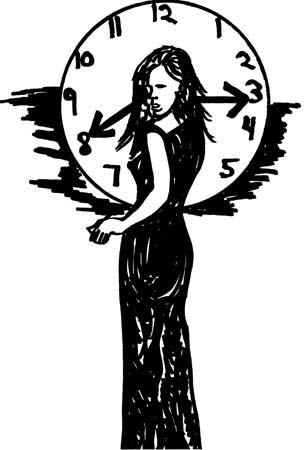
Time, art by Edward Michael O’Durr Supranowicz
The Pendulum 2Eric Obame
Time is such a subtle thing
|
| Janet Kuypers reading the Eric Obame poem the Pendulumm 2 read from cc&d magazine from Scars Publications, in the 12/10 v215 issue, which was also released as the 6" x 9" ISBN# book Entering the Ice Age |
|
Watch this YouTube video of this poem read by Janet Kuypers (cc&d magazine editor) 12/07/10, live at the Café in Chicago |
Rune Tune for WritingTom (WordWulf) Sterner
Turn the music down
|
Singing Leaves Him SadTom (WordWulf) Sterner
A blue jean poet
|
Sleeping Earth BibleTom (WordWulf) Sterner
Cherokee proverb:
|
| Janet Kuypers reading the Tom (WordWulf) Sterner poem Sleeping Earth Bible read from cc&d magazine from Scars Publications, in the 12/10 v215 issue, which was also released as the 6" x 9" ISBN# book Entering the Ice Age |
|
Watch this YouTube video of this poem read by Janet Kuypers (cc&d magazine editor) 12/07/10, live at the Café in Chicago |
Tom {WordWulf} Sterner BioTom {WordWulf} Sterner, lives in Redding, California and Arvada, Colorado. He has been published in magazines and on the internet, including Howling Dog Press/Omega, Skyline Literary Review, The Storyteller, and Flashquake. He is winner of the Marija Cerjak Award for Avant-Garde/Experimental Writing and was nominated for the Pushcart Prize in 2006 and 2008. He edited the English translation of Hameed Al-Qaed’s ‘Noise of Whisper’, edited and wrote the forward for the Arabic to English translation of the poets of Bahrain, ‘Pearl, Dreams of Shell’ published in 2007. Published work includes two novels, Madman Chronicles: The Warrior and Momma’s Rain.
|
“All depends on the preponderance
Fritz Hamilton |
I wish I were Mel Gibson’s woman, soFritz Hamilton
I wish I were Mel Gibson’s woman, so
making movies of Jesoo just as violent &
will hit him in the mouth if he tries a
Jesoo is King of the Jews/ Roger Ebert will
Jesoo’s afraid to face Mel, for fear he’ll
let sweet Mel off easy, because
the Christian community idolizes Mel like
there’s any love in Mel’s porno flick, it’s
King of the Jews, doesn’t like it, Mel !
|
Man vs Woman: A Brief Sexual HistoryChangming Yuan
No man is perfect to begin with
Just as god made man in his image
|
Changming Yuan BioChangming Yuan, two-time Pushcart nominee and author of Chansons of a Chinaman (2009) and Politics and Poetics (2009), who grew up in rural China and published several books before moving to Canada, currently teaches writing in Vancouver and has had poetry appearing in Barrow Street, Best Canadian Poetry, CC&D, Exquisite Corpse, London Magazine and 270 other literary publications worldwide.
|

Spook, art by the HA!man of South Africa
The FixerMel Waldman
The hypnotic man
his magnetic voice
|
| Janet Kuypers reading the Mel Waldman poem The Fixer read from cc&d magazine from Scars Publications, in the 12/10 v215 issue, which was also released as the 6" x 9" ISBN# book Entering the Ice Age |
|
Watch this YouTube video of this poem read by Janet Kuypers (cc&d magazine editor) 12/07/10, live at the Café in Chicago |
BIOMel Waldman, Ph. D.
|
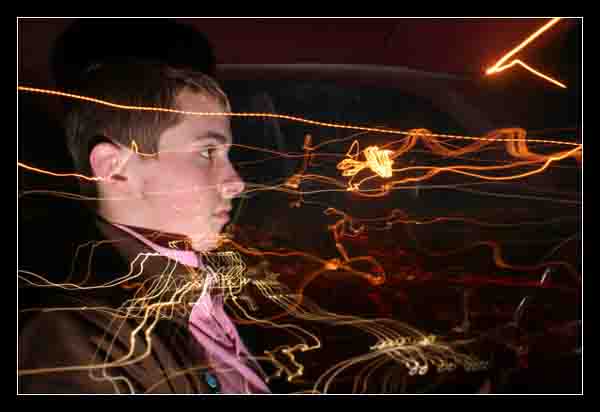
89 Dodge, art by Nick Brazinsky
Crazy MathTerry-Hamilton Poore
My youngest is learning to use the toilet.
At his age I loved the anatomy floor
I can’t go there now. All I see in those bottles
But here the freckled legs are drumming
and everything reductive and isolated in my life gives way
|
| Bob Rashkow reading the Terry-Hamilton Poore poem Crazy Math read from cc&d magazine (that Janet Kuypers is the editor of) from Scars Publications, in the 12/10 v215 issue, which was also released as the 6" x 9" ISBN# book Entering the Ice Age |
|
Watch this YouTube video of this poem read by Bob Rashkow 12/07/10, live at the Café in Chicago |
the Enemy is GenerousLana Santorelli
sky torn
quiet child
|
| Bob Rashkow reading the Lana Santorelli poem the Enemy is Generous read from cc&d magazine (that Janet Kuypers is the editor of) from Scars Publications, in the 12/10 v215 issue, which was also released as the 6" x 9" ISBN# book Entering the Ice Age |
|
Watch this YouTube video of this poem read by Bob Rashkow 12/07/10, live at the Café in Chicago |
“So”Janet Kuypers07/19/10
so the hotel I was in
so i pulled into some dive
i kept me head down
and i didn’t even notice
of liquid into the coffee cup
i watched this black mass
i don’t like coffee, you see
but this was my fault
so there i was
so i’ve got this bailey’s flask in my pocket
so my eyes dart right, then left then slowly drizzle in the creme i watch it form a mushroom cloud from within that contained bomb
i try to remember where i am
i didn’t know
i just looked at my coffee previously published in Heavy Hands Ink
|
| “So” performed live |

Watch this YouTube video 11/06/10 from the TV camera in Lake Villa at Swing State, live in her show Sexism and other stories |

Watch this YouTube video 11/06/10 in Lake Villa at Swing State, live in her “Visual Nonsense” show Sexism and other stories |
 Watch this YouTube video
Watch this YouTube videoa live 09/18/10 reading of this poem at Vittorio Carli’s Pilsen open mic at Cafe Mestizo |
 Watch this YouTube video
Watch this YouTube videoread from cc&d magazine from Scars Publications, in the 12/10 v215 issue, which was also released as the 6" x 9" ISBN# book Entering the Ice Age, live 12/07/10, live at the Café in Chicago |
Build Your Own CrossJanet Kuypers07/24/10 edited 07/25/10
why be a carpenter
selling mass produced why be a carpenter why build your own cross when Walmart can do it for you previously published in Heavy Hands Ink
|
| the Janet Kuypers poem Build Your Own Cross read from cc&d magazine from Scars Publications, in the 12/10 v215 issue, which was also released as the 6" x 9" ISBN# book Entering the Ice Age |
 Watch this YouTube video
Watch this YouTube videoread from cc&d magazine from Scars Publications, in the 12/10 v215 issue, which was also released as the 6" x 9" ISBN# book Entering the Ice Age, live 12/07/10, live at the Café in Chicago |
| the Janet Kuypers twitter-length poem (in 3 “tweets”) Build Your Own Cross |

Watch this YouTube video live at the Café in Chicago 07/27/10 |
Teaching Our ChildrenJanet Kuypers08/06/10
he hears a father & son THIS teaches our children?
|
| the Janet Kuypers poem Teaching Our Children read from cc&d magazine from Scars Publications, in the 12/10 v215 issue, which was also released as the 6" x 9" ISBN# book Entering the Ice Age |
 Watch this YouTube video
Watch this YouTube videoread from cc&d magazine from Scars Publications, in the 12/10 v215 issue, which was also released as the 6" x 9" ISBN# book Entering the Ice Age, live 12/07/10, live at the Café in Chicago |
be free of youJanet Kuypers09/02/10
I want to pull off my face
I want to be free of you |
| the Janet Kuypers poem Be Free of You read from cc&d magazine from Scars Publications, in the 12/10 v215 issue, which was also released as the 6" x 9" ISBN# book Entering the Ice Age |
 Watch this YouTube video
Watch this YouTube videoread from cc&d magazine from Scars Publications, in the 12/10 v215 issue, which was also released as the 6" x 9" ISBN# book Entering the Ice Age, live 12/07/10, live at the Café in Chicago |
Untitled (amber/embers)Jane Stuart
An early evening wind
Brightly, the rising sun
The cicada is still.
|

art by Eric Bonholtzer
BondEmmanuel Jakpa For Venie and Emma
It a special privilege, you said, to have seen
|
Emmanuel Jakpa BioOritsegbemi Emmanuel Jakpa was born in Warri, Nigeria, and currently lives in Ireland. His poetry has been published widely, including The Diagram, Landing Places, Echoing Years, Barnwood, and Edison Literary Review. He has been nominated for Pushcart Prizes three times, and he received the 2008 Yeat’s Pierce Loughran Award.
|

US_101_1955, art by Jay Marvin
Destruction BeginsCarol Garth
I want to break your heart. Construction ends
|
When I entered the RoomJohn Grey
I did not touch her
|
Keys to the KingdomMaxwell Baumbach
the key
|
Maxwell Baumbach BioMaxwell Baumbach is a writer from Elmhurst, Illinois. You can see him at www.youtube.com/MaxwellThePoet. He is also the editor of the new publication Heavy Hands Ink. His work has appeared in Opium Poetry 2.0, The Cynic Online Magazine, Thunderclap!, Record Magazine, Black-Listed Magazine, and Five Fishes Journal. It is upcoming in vox poetica, Yes, Poetry, Clutching at Straws, and The Shine Journal. He enjoys watching pro wrestling, which is totally real, as well as reading obscene amounts of poetry.
|
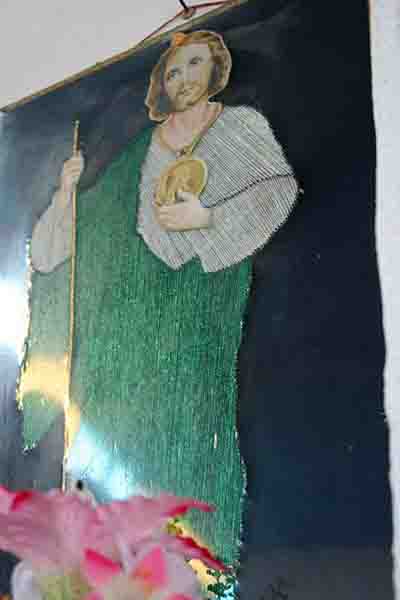
Tending the Flock, art by Brian Hosey and Lauren Braden
Our Lady of MustangHank Sosnowski
Curiosity drove me here
Church lot is full
I sit parked and scribbling
Back at home
|
BioHenry Sosnowski
|
Safe WordsBrooke Bailey
I help you with the heavier pieces of equipment, hold the camera
I remember being hit in the bedroom, and so did my jaw
After the rape I wanted to be hit, if I had to have sex, I wanted
I would have never stood for zippers made of clothes pins being
and I realized I couldn’t do any of it. My mind was wrapped
I’m only here today to help you, to try to remember that once
my body wants to break the equipment,
|
A Day in the Life of an Ordinary JoeCopyright R. N. Taber 2010
On a long, long road
Clouds, gathering
People, clutching rolled umbrellas
Children, forgotten
Parents, frightened
Sunlight, persuading ghosts to write
Thin, polluted air
Sounds of battle
World leaders playing cat and mouse
|
Senility PrayerHank Threadgill
I’m told that when
|
Hank Threadgill bioHank Threadgill was raised near the Fort Worth stockyards in North Texas, in a neighborhood they used to call “Hell’s Half Acre.” A former musical instrument salesman and the son of a Southern Baptist preacher, Hank relocated to Arlington, TX in the late 1940s, where he has slowly seen open fields turn into parking lots. He was born in 1922, the same year as Kurt Vonnegut, Jack Kerouac, and Howard Zinn, though he rarely esteems himself worthy of such marvelous company. His poetry has appeared sporadically over the years in many journals that are now defunct, such as: Backboard Quarterly, Sign Waves, The Hemlock Review, Time & Again, Gone Fishing, Glossolalia, Fail Swoop, The Vicambulist, and Zero Ducats.
|
The Only Four PoemsLouie Crew
Nature is gorgeous.
|
| Janet Kuypers reading the Louie Crew poem The Only Four Poems read from cc&d magazine from Scars Publications, in the 12/10 v215 issue, which was also released as the 6" x 9" ISBN# book Entering the Ice Age |
|
Watch this YouTube video of this poem read by Janet Kuypers (cc&d magazine editor) 12/07/10, live at the Café in Chicago |
Louie Crew BioLouie Crew (a.k.a. Li Min Hua), 73, an Alabama native, is an emeritus professor at Rutgers. He lives in East Orange, NJ, with Ernest Clay, his husband of 36+ years. As of today, editors have published 1,987 of Crew’s poems and essays. Crew has edited special issues of College English and Margins. He has written four poetry volumes Sunspots (Lotus Press, Detroit, 1976) Midnight Lessons (Samisdat, 1987), Lutibelle’s Pew (Dragon Disks, 1990), and Queers! for Christ’s Sake! (Dragon Disks, 2003). The University of Michigan collects Crew’s papers.
|

art by John Yotko (Puerto Rico)

prose
the meat and potatoes stuff
London in the EveningNatascha Tallowin
What a lark, to be sitting here, watching, sitting here on one’s own in the café of a bookshop, surrounded by these clusters of new and crisp smelling books, tea and cake. Tea and cake! On a Sunday afternoon.
|
Natascha Tallowin BioNatascha Tallowin is a writer and poet from Suffolk, England. Whilst most of her time is spent writing poetry and sitting in patches of sunlight on the floor listening to David Bowie, she is also working on a magic-realism novel entitled ‘Guylian’s Magic’.
|

Parking Lot Tree, art by Cheryl Townsend
The Hundred Dollar BillAnne Turner Taub
Penny Anderson loved browsing in thrift shops. Her friend Marlee laughed at her and claimed that was her way of getting therapy cheaply. Penny grinned as she let it slide off her back and went merrily on thrift-shopping whenever she had the opportunity.
|

Some Assimilation Required, art by Aaron Wilder
WalkingMarco Bisaccia
Just throw out the guilt, she said, throw it away. It’s no good to you. You don’t need it.
The road had been wet that night. We left the party feeling all right. Connie wanted to get home and go to bed. She rode with Franklin’s wife so they could talk. Franklin rode with me in the van. I drove. I asked him to wear his seat belt but Franklin said he didn’t believe in those things.
I got out of bed every morning and went to work. At the office I tried not to think about it. I edited the newsletter. Nobody said much to me. Sometimes I solicited information from colleagues for articles, otherwise I minded my own business — unless we had a meeting and someone asked me a question. Franklin was dead. Nothing I did would change it.
One Monday I was finishing the weekly newsletter when the phone rang. It was Detective MacCauley. You’ll be happy to know, he said, that we won’t be filing charges against you for the accident; your insurance company isn’t even accepting liability. The papers will be processed in the next week but I wanted to let you know as soon as we reached a conclusion.
That night I woke up at two o’clock. It felt like Connie had kicked me. I turned to her and called but she didn’t answer. One arm covered her face; the striped nightgown rose and fell steadily. The moon, peering through the curtains, lit up her hair. I put my head back on the pillow. I got bored one night. Connie slept in front of the TV. There was nothing on and the VCR was broken. I’d read all the good books in the house. The library was nearby but it closed at eight. I had to have something to read. Anything but the newspaper. The bookstore at the mall closed at ten. Maybe a friend could give me a ride. But I couldn’t pick up the phone. The keys were on the counter by the door. I watched them for a while.
The engine turned right over. I squinted and looked over the dash. A few cars were parked on the street but no one was around. The wind blew and the leafless branches bent toward the pavement.
|
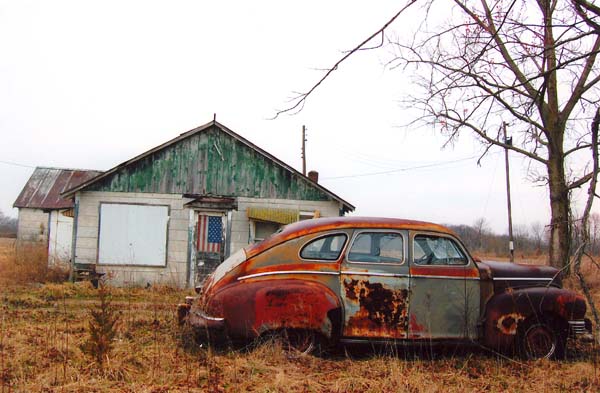
art by David Thompson
Doris Day’s HatDerek V. Hunter
“What do you think of this one?’ a quick and forceful female voice demanded while the owner of the voice, Linda, held up a one-piece swimsuit.
|
Geronimo Does WalmartJohn Duncklee
I was spending time up around the Gila River in Apache Spirit World when an old warrior friend of mine approached me with a large smile on his face. He told me about a recent trip he had made to a city in southern New Mexico, not too far from where we were having our conversation. He told me about a large store that could provide shelter for damn near the entire Apache Nation all under one roof. It also had a parking lot that was full most of the time. This friend of mine highly recommended that I make the same trip to visit what he said the White Eyes called “A Big Box Store”.
|
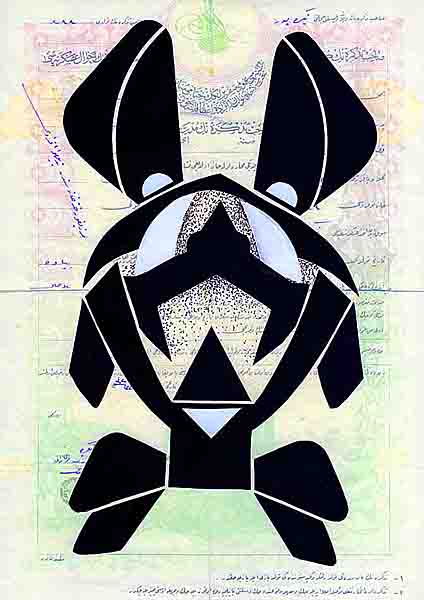
DESEN 360 KUCUK, art by Üzeyir Lokman ÇAYCI
The Indian CurseArunPrakash Dn.He quivered in the frost French cold, under the thick down-comforter filled with fluffy bird feathers, even as the bedroom heater murmured with its golden coils, nearby. It was stark dark and chilly outside, and he needed more than just the warmth that he savored under the blanket to keep off from the frigidity. He shook more, thinking it would help shiver the cold off him; and it did. He was getting a hold of the warmth surging through his body, while the Angel beneath him quivered along, in pleasure, helping him to culminate in the place, he wanted to achieve. Slight shrieks and gasps of delectation added flavor to the moist air and Natasha’s face showed expressions of extreme pleasure. “Séduisant”, as they would call in the Romantic Language, was the right word to describe the environment Jake was in - Frosty dark night with snow fringed glass windows, chilly atmosphere with a cozy fake-fireplace, the faint hum of the electrical heater which looked out furtively from within the hearth, the stardust French architecture with a mix of contemporary and medieval modernism, and the luscious English woman wanting him more every second, under the quilt. Natasha was a frequenter, and was known for her throbbing lips, amongst Jake’s associates. “You could even bargain your life for her kiss.” Arthur had said ogling at her, back in La Piscine - The Swimming Pool - that morning. “Do your job!” Jake had dismissed strictly, except his eyes still glued, till she entered the bath. ‘Her lips are mine, now!’ And when Jake saw it parting with another gush of delight, he muzzled, helping her deliberately to breathe in his breath.
Tyler, a Voodoo practitioner in his early forties, with gray strands already sprouting from his head, had four PhDs in his backpack. This rare mix of mysticism and science projected him exceptionally in the Indian neighborhood. He started studying this arcane art, since a year before Jake, to research on the craft, when he fell in love with it - with the power it pledged. Tyler was just another regular megalomaniac who wanted power in his hands, men beneath his legs, and the women between them. For thirty-three year old Jake Foster, getting Natasha into bed was like a piece of emblazoned Dacquoise from the La Boulangerie Française. All he needed was the meshed locks of thin dark-brown hair, entangled between the pointed cotton strands of the soft bath towel, that she had left after her hot shower. Actually, he just needed a tiny chip for the DNA. Every night, the Demon within him demanded an Angelic beauty to devour, and Jake had to deliver. Success in anything demands a sacrifice, and Jake had to lose his picturesque future, for his concupiscent present - a result of his ghastly past. He now had the power of control over them - the power to attract women and to enslave - a rich souvenir from the putatively poor India. His Theological studies in various countries gave him nothing less than awe. But his knowledge on the Indian Voodoo transformed his life, endlessly. Two years back, in the last few months of his course at the Theosophical Society of India, he visited the suburbs of the Holy Indian places, where voodoo was still practiced. That was where he met Tyler.
“I... I’m sorry about that.” Jake confessed, when they were outdoors.
Jake felt a spasm near his waist and his face tightened. He looked below on Natasha. She looked like she was about to cry. Her beautiful wrinkle-less faced crumbled to a thousand marks of desire, and Jake loved it. He had seen many faces through his nights, but Natasha’s topped them all. Her lips were the icing on her gorgeous face, and Arthur had said it right. ‘You could even bargain your life for her kiss.’ As the Demon within him pounced out, Jake forced him in her, making Natasha squeal in both pain and pleasure. When he saw her lips part, Jake did the same thing he loved doing: he covered her with his lips, thereby feeding and feeling the short pressurized gasps in the inner walls of his mouth. With her last gasp, Jake felt his nerves twist as he released Natasha from his clutches, and tumbled down from her soft body, lying there, beside her, in crude satisfaction, as the Demon within him smiled from within his eyes, for the scrumptious meal.
“Catherine...” Patricia called out, and a little moving doll came jumping before her with a stuffed teddy in her hand.
Jake squinted as the healthy sun’s rays lighted his face, through the window. Composing himself that he had slept on the single-couch the earlier night, he stretched his limbs out, and in the unmindful act, the small portrait he withheld, all through the night, glided down, hit the floor, and toppled till it came to a stop, touching slightly a small closed brass cup placed near the hearth. In effect, the brass cup jolted and the reddish-brown liquid within the closed container oozed through the capped brim. Trickling over the smooth semi-golden structure, two drops of human blood touched the stark brown wooden floor, thereby tracing a semi-circle of the cup’s base on the laminated flooring. Jake carefully replaced his precious portrait over the mantel, atop the fireplace, and turned to his bed, disregardful of the small brass cylinder or the red trace. He noticed the bed empty, and smiled. Natasha had already gone; the trance lasts only till an additional few hours after midnight, after which the target recoups herself with a confused mind, straight back to her home. The voodoo seduction was foolproof and safe as nobody gets harmed; almost.
“So, the girl just goes back without even knowing that she was ravaged?” Jake enquired. From the time Tyler had explained how Voodoo works scientifically, Jake was inclined to rake more.
“Ah!” Jake declared. “That’s it! That’s the girl I’ll have for tonight.”
|
CoronaryMargaret Karmazin
It was the damn heartburn again - that ulcer must be back. Then suddenly, surprisingly, he vomited. As he sank to the floor, he realized he was dripping with sweat. He saw Paula’s legs by his head before blacking out. He came to in the hospital, hooked up to monitors, an IV taped to his arm and numerous people hovering.
There followed, though the state he was in, he couldn’t determine if anything followed anything, a faint beeping, a feeling of being swaddled, the sensation of something in his nose and someone speaking with an Hispanic accent - that particular tilt to the voice, a woman’s voice. Someone not far. Where was he?
Marshall again heard a woman’s voice with the Hispanic accent, not Nidia, that same someone else, but now she seemed to move further away and disappeared into a fog of faint noise.
The male nurse, if that’s who that was, must have left. Marshall couldn’t seem to work up the energy to open his eyes, though he could discern light and dark, know when someone leaned over him, when they were gone.
He opened his eyes. A male nurse appeared above him, smiling. “Mr. Wright, how good to see you awake!”
|

Shrine for a Soldier, art by Mark Graham
BrothersBillie Louise Jones
Winter in New Orleans is miserable. It is a grey, damp cold that seeps into the marrow and stays there. A tropical city looks shabby in the winter.
|
French Quarter NightBillie Louise Jones
A sleeping French Quarter street, gold street lights blended down to grey shadows along the shuttered houses, all the striving and noise of the day now hushed, resting; and the bars have turned out their last patrons.
|
Love Or Something Like ItBillie Louise Jones
His grey Peugeot was parked in front of her building, an unpainted brick one with blue shuttered French windows and grapeleaf ironwork. He was not really handsome, but he had the presence that a successful middle-aged man does acquire. He had an expensive tan, and his sports clothes were thrown on just so. He causally tossed a Vuitton bag into the back seat.
|
Mardi GrasBillie Louise Jones
Mardi Gras parades began on impulse, with high-spirited Creole youths riding from house to house for a last celebration before the Lenten fast. Over time, the parades and balls grew into big festivities that possessed the French Quarter. Pagan, no doubt; but wonderful. New Orleans believes in parades and does them better than any other city and, showing its own perspective on value, shuts down business for a parade. The richest men spend lavishly on floats, dream for years of being King for a night, virtually taxing themselves to please the masses, and remain anonymous, merged in their role. And the throws – strings of bright colored beads bestowed and received as largess! These throws, treasures tonight, trash tomorrow, are the vanity of human wishes. The floats became more and more fantastic creations. The parades grew in number and grew literally – the gorgeous floats became too big for the narrow Vieux Carrè streets. So the parades were moved out of the French Quarter to St. Charles and Canal.
Ghosts and goblins and clowns, studded leather and rhinestone monokinis, velvet and lace and blue jeans, Elizabethan princesses of any sex, women’s bare tits and men’s bare butts, faces painted humorously dramatically fantastically.
|
RestorationsBillie Louise Jones
The tan workman’s van was parked with the left wheels on the sidewalk, the way they did it in the narrow, one way French Quarter streets. The van was lettered “Restorations/French Quarter Specialists.”
|
Seize the DayBillie Louise Jones
A young man walked through the Quarter; every detail was conscientiously yuppie. He was seen walking through the Quarter most days. Many entry-level professionals in the Central Business District parked their cars in the Quarter to save the parking fee. He saw a girl across the street. She stood by a gate between building, searching in her purse for the key. Though her femininity was well restrained by a dress for success suit, she was pretty, with full, dark hair and Egyptian eyes. He called out a name and quickened his steps, not too much, not to let her think he was eager; but still his smile was anxious.
|
Summer EveningBillie Louise Jones
Summer days are long in the South. Evening light stretches out pleasantly for a long time after supper. A man sat on his front steps reading the Times-Picayune. He was about forty, nicely dressed in casual clothes, well known in the neighborhood for years as a landlord who was a virtual Quarter historian, active in community affairs. There was a zipbag on the step beside him. A man, very presentably groomed, got off the bus after work and stopped by the man on the steps. It was two neighbors visiting. Only, behind the paper there was a quick exchange, money from one, something out of the zipbag from the other. |
Are You Listening?Amanda Berthault
I’m bored as fuck and there’s still four hours until the show. So I’m just out here having a smoke, killing time. You know what I like about this place? This area here, underground, all secret like. We can park our tour bus and unload our gear in peace, you know? That’s how come I can come out here to have a smoke, get some fresh air.
|

Debra Purdy Kong, writer, British Columbia, Canada I like the magazine a lot. I like the spacious lay-out and the different coloured pages and the variety of writer’s styles. Too many literary magazines read as if everyone graduated from the same course. We need to collect more voices like these and send them everywhere.
Children, Churches and Daddies. It speaks for itself. Write to Scars Publications to submit poetry, prose and artwork to Children, Churches and Daddies literary magazine, or to inquire about having your own chapbook, and maybe a few reviews like these.
what is veganism?
vegan action
MIT Vegetarian Support Group (VSG)
functions:
For More Information Please Contact: Deborah Anderson dja@crest.org or (202) 289-0061
 
|